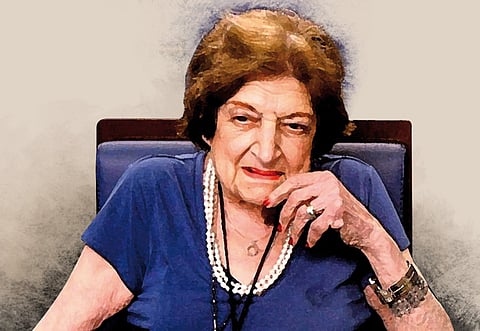Helen Thomas: An exemplary journalist
Helen Thomas defended to the end her First Amendment right to say what was on her mind

Helen Thomas, the legendary senior White House reporter who had aggressively questioned, indeed challenged, presidents and their press secretaries since 1960, retired from journalism on June 7, at age 89, the way she has always practised her craft — with dignity.
Thomas, the daughter of an illiterate Lebanese immigrant, embarked on her career imbued with the notion that the true journalist, a watchdog over potential government malfeasance, must tell it like it is and let the chips fall where they may. No elected official, from the president on down, is above the law. No official policy is above being probed by an accredited representative of the Fourth Estate. But, more than that, Thomas believed in the sanctity of free speech in the public debate, regardless of how objectionable that speech may appear to others.
I can attest to that by recalling my first encounter with the doyenne of the Washington press corps around the end of October 1981, when she did not converse with me so much as snap at me.
"Let the man speak," she commanded, a touch imperiously. "He's entitled to express his views." And when the woman who had brought presidents, from Kennedy to Obama, to a dithering stammer with her no-holds-barred questions, commands you, well, you listen. You respect your elders, not to mention your betters.
The occasion was the Fay-Arab conference in Washington, a large gathering of community leaders from South and North America, when the unfortunate choice of keynote speaker was journalist Robert Pierpoint. I say unfortunate because this man, though he had repeatedly filed reports from the Middle East, was clueless about the region's national mood at the time. In his speech he proceeded to extol the virtues of Anwar Sadat, assassinated two weeks earlier, as a visionary peacemaker. Many in the audience, who believed that the late Egyptian president had betrayed Palestine and the Arab cause in general by signing a separate peace agreement with Israel against the pleas of other Arabs were not impressed. Those at the table where I was sitting, closest to the podium, heckled the speaker mercilessly, flustering Pierpoint.
Of course we were wrong, and rude, to do that. Once the man had been invited by the sponsors of the event to give the keynote address, he was entitled to express his views, regardless of how off-base they seemed. And that's where Thomas came in.
There is a lot of irony here, for Thomas lost her job because she exercised the same right that she had upheld throughout her long, distinguished career — the First Amendment right of US citizens to say what's on their minds without fear of retribution or ridicule.
Peculiar turn of events
There is no need here to recount in detail the events that led to the demise of Thomas' career as a reporter, and more recently as a columnist. Briefly: At a White House function, the octogenarian was needled by a rabbi about her views on Israel, and she exploded with an intemperate observation about how Israelis should get out of Palestine and go back to wherever they came from. Well, her employers at Hearst Corporation did not like that one bit and thus asked her to fold her tent and be on her way. Never mind that she was not then a reporter, who clearly must cultivate objectivity at all times, but a columnist, where your little plot of real estate on the op-ed page is reserved for the articulation of opinions. But this is America where, unlike Europe, Israel remains a holy cow and negative views about it are considered tantamount to anti-Semitism.
No one can question Thomas' trailblasing career or forget her feisty challenges of presidents whose policies had gone awry. After 35 years in Washington, where I watched White House briefings carefully, I cannot recall another correspondent who, for example, stood up as aggressively to president George W. Bush over his disastrous Iraq policies.
In an interview with Vice magazine in March, she said that in the run-up to the Iraq war her colleagues were far too docile. "Everyone," she recalled, "rolled over and played dead". Now, of course, we all know that media commentators betrayed the public trust by failing to see through the smokescreen of comical assertions by people like Rafid Ahmad Alwan (aka Curveball, a mentally disturbed CIA Iraqi asset) and Ahmad Chalabi with regards to Saddam Hussain's mythical weapons of mass destruction, America's casus belli.
Thomas' most recent book, published in 2007, was called Watchdogs of Democracy? The Waning Washington Press Corps and How It Has Failed the Public. These could be the final words from this distinguished woman's long, productive career — a sad adieu from a reporter who embodied the persona of a media watchdog; a mixture of coldness and passion, detachment and persistence. And, yes, at times, vulnerability and impulsiveness too, as evidenced by the fact that she let a crafty Zionist advocate needle her into a career-wrecking observation about Israel. Only in America, folks.
Fawaz Turki is a journalist, lecturer and author based in Washington. He is the author of The Disinherited: Journal of a Palestinian Exile.


